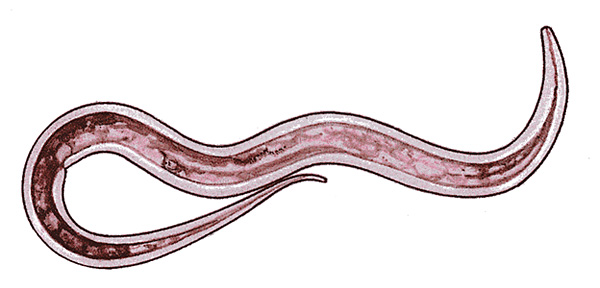Roundworm, also called nematode or eelworm, is any of more than 12,000 species of worms. Most kinds of roundworms live freely in soil, water, dead plants, or dead animals. Other roundworms are parasites. They live and feed on living plants and animals, which serve as hosts. Some parasitic species cause serious diseases in people, livestock, and crop plants. One species of roundworm, Caenorhabditis elegans, has proven especially valuable in biological research.

Roundworms range in size from microscopic to more than 3 feet (90 centimeters) long. They have slender, round bodies with tapered ends. Roundworms have remarkable powers of reproduction and are extremely numerous. Researchers have found more than 90,000 roundworms in a single rotting apple.
Nearly all species of roundworms reproduce by laying eggs. Some produce great quantities of eggs. For example, females of the species Ascaris lumbricoides each lay about 200,000 eggs per day for at least 10 months. In many roundworms, the eggs hatch into tiny young that look like adults. Eggs of other species hatch into young called larvae, which gradually transform into adults. Roundworms that do not lay eggs give birth to larvae.
Parasitic roundworms may infect a host in a number of ways. Some species enter the host when the host swallows food that contains the roundworm, its eggs, or its larvae. Among other species, the larva burrows into the skin of the host. In still other species of roundworms, the larva is taken up by an insect, such as a fly or a mosquito, and transmitted through the bite of that insect to the host.
At least 14 species of roundworms cause infection in human beings. A. lumbricoides, which inhabits the small intestine, infects millions of people around the world. It causes a disease called ascariasis. Symptoms of this disease include pneumonia and intestinal pain. The roundworm Trichuris trichiura infects the large intestine and occurs in millions more people worldwide. It causes trichuriasis, a disease characterized by diarrhea. Other common roundworms that cause disease in human beings include filariae, hookworms, pinworms, and trichinae (see Filaria; Hookworm; Pinworm; Trichina).
